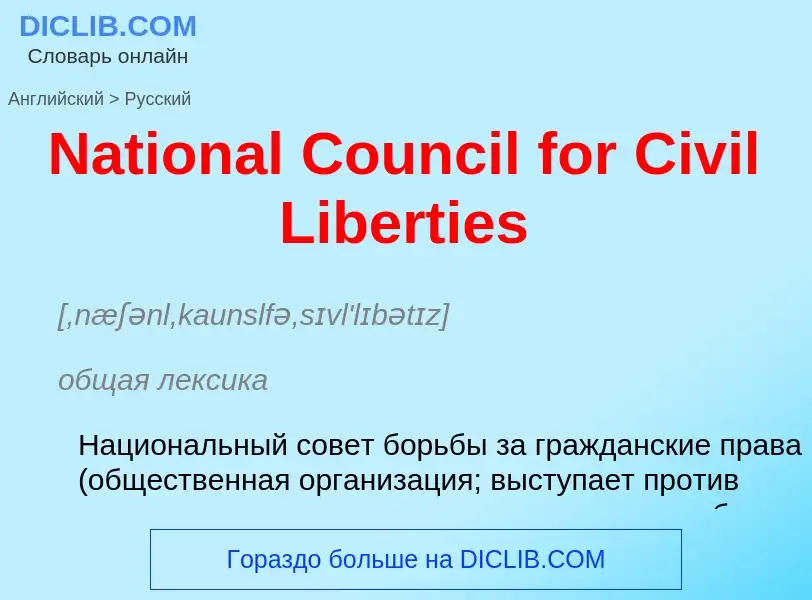Μετάφραση και ανάλυση λέξεων από την τεχνητή νοημοσύνη ChatGPT
Σε αυτήν τη σελίδα μπορείτε να λάβετε μια λεπτομερή ανάλυση μιας λέξης ή μιας φράσης, η οποία δημιουργήθηκε χρησιμοποιώντας το ChatGPT, την καλύτερη τεχνολογία τεχνητής νοημοσύνης μέχρι σήμερα:
- πώς χρησιμοποιείται η λέξη
- συχνότητα χρήσης
- χρησιμοποιείται πιο συχνά στον προφορικό ή γραπτό λόγο
- επιλογές μετάφρασης λέξεων
- παραδείγματα χρήσης (πολλές φράσεις με μετάφραση)
- ετυμολογία
National Council for Civil Liberties - translation to ρωσικά
[,næʃənl,kaunslfə,sɪvl'lɪbətɪz]
общая лексика
Национальный совет борьбы за гражданские права (общественная организация; выступает против нарушения властями гражданских прав и свобод населения: несанкционированных арестов, незаконного увольнения с работы, дискриминациии и преследования по политическим мотивам и т.п. Образована в 1934)
[indi'vidʒuəl'libəti]
общая лексика
свобода личности
Ορισμός
Βικιπαίδεια

Liberty, formerly, and still formally, called the National Council for Civil Liberties (NCCL), is an advocacy group and membership organisation based in the United Kingdom, which challenges unjust laws, protects civil liberties and promotes human rights. It does this through the courts, in Parliament and in the wider community. Liberty also aims to engender a "rights culture" within British society. The NCCL was founded in 1934 by Ronald Kidd and Sylvia Crowther-Smith (later Scaffardi), motivated by their humanist convictions.
During the 1950s, the NCCL campaigned for reform of the mental health system, under which people known to be sane but deemed 'morally defective' – unmarried mothers, for example – could be locked up in an asylum. By 1957, the campaign had seen the release of around 2,000 inmates, the abolition of the Mental Deficiency Act 1913, and the establishment of new Mental Health Review Tribunals which culminated in the Mental Health Act 1959.
Since 2016, Liberty's work has been dominated by a High Court challenge to the Investigatory Powers Act, as well as campaigning against the so-called 'hostile environment' policies which allow indefinite immigration detention in the UK.
In autumn 2019, the organisation set up Liberty Investigates, an editorially independent journalism unit. Its initial focus was on how the coronavirus pandemic affects Human Rights in the UK.


![Huge rallies like this one in [[Kolkata]] are commonplace in [[India]]. Huge rallies like this one in [[Kolkata]] are commonplace in [[India]].](https://commons.wikimedia.org/wiki/Special:FilePath/Dyfikolkata (54).jpg?width=200)
![Broken Liberty: [[Istanbul]] Archaeology Museum Broken Liberty: [[Istanbul]] Archaeology Museum](https://commons.wikimedia.org/wiki/Special:FilePath/Li-ber-ty.jpg?width=200)
